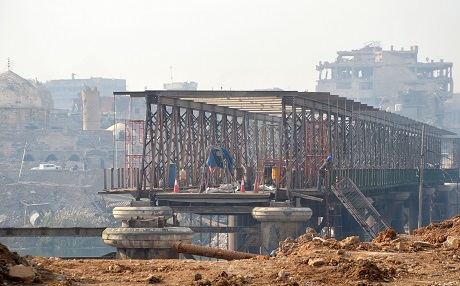More than half Iraqis displaced by conflict have returned home: IOM

ERBIL, Kurdistan Region – More than half of Iraqis displaced by conflict have returned to their homes as of the end of 2017, according to the UN’s migration agency.
More than 3.2 million internally displaced persons (IDPs) had gone home by the end of December, while 2.6 million are still displaced, the International Organization for Migration (IOM) stated on Thursday.
“The retaking of areas by the Iraqi forces is significant, as is the improvement of security,” said IOM communications officer Sandra Black, according to AFP.
About a million people have returned to Anbar province.
The situation for those returning home is still far from ideal however.
According to IOM figures, the houses of almost all those who went home had some level of damage. About 60 percent were moderately damaged and a third were significantly or completely damaged, said Black.
People also reported no water or electricity supplies in some areas.
With the declaration of victory of ISIS in Iraq, made by Iraqi Prime Minister Haider al-Abadi in December, the focus has now turned to ensuring security and stability.
“Nothing is more important right now in Iraqi than stabilizing the areas which have been liberated from ISIS,” Lise Grande, United Nations Development Program (UNDP) representative in Iraq, said recently. “The task is huge. Electricity grids need to be rehabilitated, water systems repaired, rubble removed and schools and hospitals opened.”
Improving the conditions in the hometowns of Iraqis who had to flee conflict “is the first step in giving people confidence in their future,” she added.
But efforts are underfunded.
The UNDP established a Funding Facility for Stabilization (FFS) in June 2015, but that fund is short by nearly $300 million, Brett McGurk said at the end of December.
McGurk is the US envoy to the global anti-ISIS coalition.
He said that closing the funding gap “is an urgent priority.”
“Reconstruction will be a multi-year process, dependent upon Iraqi reforms, international financing, regional trade, and creating the conditions for private investment,” McGurk explained.
The FFS, in coordination with the Iraqi government, is focusing its efforts on repairing public infrastructure, providing small business grants, and supporting local government.
More than a quarter of its over 1,200 projects are in Mosul.
The Kurdistan Region is hosting 1.19 million displaced Iraqis, as of early December 2017, according to official figures.
Construction work on Mosul’s Old Metal bridge, damaged during the military offensive to defeat ISIS in the city. Photo: Ahmad Muwafaq/AFP
More than 3.2 million internally displaced persons (IDPs) had gone home by the end of December, while 2.6 million are still displaced, the International Organization for Migration (IOM) stated on Thursday.
“The retaking of areas by the Iraqi forces is significant, as is the improvement of security,” said IOM communications officer Sandra Black, according to AFP.
About a million people have returned to Anbar province.
The situation for those returning home is still far from ideal however.
According to IOM figures, the houses of almost all those who went home had some level of damage. About 60 percent were moderately damaged and a third were significantly or completely damaged, said Black.
People also reported no water or electricity supplies in some areas.
With the declaration of victory of ISIS in Iraq, made by Iraqi Prime Minister Haider al-Abadi in December, the focus has now turned to ensuring security and stability.
“Nothing is more important right now in Iraqi than stabilizing the areas which have been liberated from ISIS,” Lise Grande, United Nations Development Program (UNDP) representative in Iraq, said recently. “The task is huge. Electricity grids need to be rehabilitated, water systems repaired, rubble removed and schools and hospitals opened.”
Improving the conditions in the hometowns of Iraqis who had to flee conflict “is the first step in giving people confidence in their future,” she added.
But efforts are underfunded.
The UNDP established a Funding Facility for Stabilization (FFS) in June 2015, but that fund is short by nearly $300 million, Brett McGurk said at the end of December.
McGurk is the US envoy to the global anti-ISIS coalition.
He said that closing the funding gap “is an urgent priority.”
“Reconstruction will be a multi-year process, dependent upon Iraqi reforms, international financing, regional trade, and creating the conditions for private investment,” McGurk explained.
The FFS, in coordination with the Iraqi government, is focusing its efforts on repairing public infrastructure, providing small business grants, and supporting local government.
More than a quarter of its over 1,200 projects are in Mosul.
The Kurdistan Region is hosting 1.19 million displaced Iraqis, as of early December 2017, according to official figures.
Construction work on Mosul’s Old Metal bridge, damaged during the military offensive to defeat ISIS in the city. Photo: Ahmad Muwafaq/AFP

